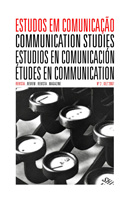Editorial | Ethical Policy | Peer Review Process
Editorial
[EN]
The main guidelines of the Journal editorial policy are oriented to the concepts of "citizenship" and "participation", understood from a communicational point of view, involving processes and devices of knowledge circulation and opinion formation in the political field in general, and in specific areas of public policy such as health, education, science culture, public opinion, gender and identity.
As examples of priority interests areas one finds the following: journalism and public opinion; citizen, participatory and public journalism; responsibility and accountability of institutions, governments and companies; media and public sphere; social movements in the areas of environment, science, health, ecology, culture, identity and gender; media and political parties; political representation; new forms of online participation; methods of analysis of participation; digital democracy; media, deliberation and participation; communitarian communication; communication and development; policies of recognition and comparative studies of communication in different geographical and cultural contexts, among others.
"Communication Studies" is intended to include various approaches, methodologies and lines of research, defining itself as a journal of Communication Sciences with an interdisciplinary profile and open to a plurality of methods.
The journal "Communication Studies" accepts articles in different areas of Communication Sciences, journalism studies, advertising, public relations, media studies, reception studies, political communication, communication theories, communication epistemology, sociology of communication and other related fields.
[PT]
A principal linha editorial da revista está orientada para os conceitos de "cidadania" e "participação", entendidos de um ponto de vista comunicacional, envolvendo processos e dispositivos de circulação de conhecimentos e formação de opinião no campo político e em áreas específicas de políticas públicas tais como saúde, educação, cultura, ciência, opinião pública, gênero e identidade.
Como exemplo de áreas de interesses prioritários encontram-se os seguintes: jornalismo e opinião pública; jornalismo cidadão, participativo e público; responsabilidade e accountability de instituições, governos e empresas; media e esfera pública; movimentos sociais nas áreas de meio ambiente, ciência, saúde, ecologia, cultura, identidade e gênero; media e partidos políticos; novas formas de participação online, métodos de análise da participação; democracia digital; media, deliberação e participação; comunicação comunitária, comunicação e desenvolvimento, políticas de reconhecimento e estudos comparativos de comunicação em diferentes contextos geográficos e culturais, entre outros.
"Estudos em Comunicação" pretende incluir várias abordagens, metodologias e linhas de pesquisa, definindo-se como uma revista de Ciências da Comunicação com um perfil interdisciplinar e aberta à pluralidade de métodos.
A revista "Estudos em Comunicação" aceita artigos em diferentes áreas do campo das Ciências da Comunicação: estudos de jornalismo, publicidade, relações públicas, estudos de media, estudos de recepção, comunicação política, teorias da comunicação, epistemologia da comunicação, sociologia da comunicação e outras áreas afins.
Ethical Policy
Estudos em Comunicação/Communication Studies is an Open Access journal. All its content is freely available without charge to the user or his institution. Users are allowed to read, download, copy, distribute, print, search, or link to the full texts of the articles in this journal without asking prior permission from the publisher or the author. Estudos em Comunicação, by LabCom.IFP, is licensed under a Creative Commons Atribuição-NãoComercial-SemDerivações 3.0 Unported License. By submitting your work to Estudos em Comunicação/Communication studies you confirm you are the author and own the copyright, that the content is original and previously unpublished, and that you agree to the licensing terms.
By submitting an article, authors agree that the rights of their work are granted to Estudos em Comunicação.
Communication Studies only publishes original content, and authors are responsible for verifying the inexistence of plagiarism, including self-plagiarism and previous publication.
By submitting your work, you also agree on the standards of expected ethical behavior, which follow the COPE’s – Committee on Publication Ethics – Best Practice Guidelines, and the International Standard Guidelines for authors.
Peer Review Process
No. of reviewers: two (2), from different institutional and geographic belongings.
Criteria for recruiting reviewers: Academic or business-related experts from a wide range of areas in the field Communication Studies; One of them being native-speaker of the language of the text in review; Who accept EC policy of double-blind peer review and criteria for publication.
Criteria of Reviewing: Double-blind Peer Review process (where both reviewers and authors remain anonymous throughout the review process); Timely Review accordingly to the Reviewer Guidelines, Criteria for Publication, and Review Confidentiality statement.




